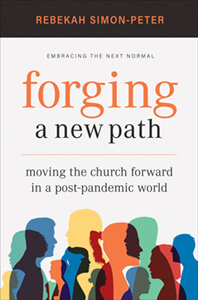When you move from being “in church” to being “in community,” your vision of others changes. Rebekah Simon-Peter offers five tips for daring to go to the soul and being in community.
When we are “in church,” we come together as a group of people. We typically greet one another, join our voices together in song and prayer, hear the preached Word, and offer some kind of response. Our hearts are warmed at seeing folks we may not have seen in the past week and to catch up on the most recent sports event, what’s happening in the community, or recent news, good or bad, that has rocked our state, nation, or world. After church, we may join others for lunch, then prepare to return to the church at the next appointed time, whether that be a mid-week Bible study, committee meeting, church project, or worship the following Sunday. Most likely, we love our church.
It’s one thing to be “in church.” It’s quite different to be “in community.” When we are in community, our care and love for one another go deeper than singing together and catching up on the latest news. Our care and love for others dares go to the soul, where the question shifts from “What’s new?” to “How is it with your soul?”
When you move from being “in church” to being “in community,” your vision of others changes. You glimpse Jesus in the eyes of the person next to you. You sense the Spirit in the questions from the new person. You look for opportunities to heal relationships instead of avoid conflict, or to address issues instead of let them fester. Judgments about others fall away as you practice the Platinum Rule. The temptation to gossip is replaced by the desire to get to know new people. Our defenses fall as we seek to find our identity in Christ and in Christian community. Imagine church as a place where people can share the depths of their lives without fear of gossip or rejection. Where the values of honesty, vulnerability, celebration, and accountability hold sway. And where we know that God speaks to us and invites our response. When it comes to building community, here are five tips:
1. Start small groups.
Small groups have always been at the heart of the church. Jesus conducted the first small groups as he called disciples and then sent them out as apostles. His small group lasted a mere three years, but all of his students became teachers of new classes after he died and was resurrected.
Many churches are creatively reinvigorating their outreach by crafting “fresh expressions” of faith, including initiatives like Pub Theology or Bibles and Beer. Instead of insisting that new people come to the church to worship with them, church folks meet people at bars, pubs, coffee shops, laundromats, and restaurants to engage in faith discussion with them. Sometimes informal settings outside the church encourage greater self-revelation and an easier way to get to know each other.
2. Keep it short and sweet.
Spend time together but keep your offerings short and sweet. People’s attention spans have shortened, and their lives have gotten busier. Instead of a year-long Bible study, offer a four-to-six-week study. Instead of a ninety-minute learning session, try forty-five minutes instead. Instead of a three-day retreat, invite others to a three-hour retreat. The point is to build togetherness with the time that people have. Many touches with the same people over time will build a more enduring community than one long experience never to be replicated.
3. Mix social and spiritual.
Intentionally combine the social and the spiritual to create stronger community. Often small groups are organized around spiritual material, and the social part gets added in. But I want to encourage you to think about having groups based on social activities that add in the spiritual. For instance, gather a group that enjoys going to the movies, with a meal before or after the film. Discuss religious or spiritual themes in the movie, letting the movie prompt discussion about your own lives. End your time together by praying for one another.
4. Start with an existing community.
Pastor RJ Davis noted that the congregation he serves was founded out of a housing development. These neighbors already had strong relationships and realized they wanted to be able to worship together, so they contacted denominational authorities and asked for a church to be planted there. True to their community nature, this congregation is all about doing life together. “People go to dinner together, take vacations together, and celebrate their kids’ birthdays together,” RJ notes. Others want to be part of this level of community, and it’s brought new people to the church. Their new vision is to “Bring intentional community back to the neighborhood.”
5. Do it together.
Remember that no one person can do this work alone. As the church comes together as community, approach community building as Rev. Heather Bailes Baker learned to do. At first, Heather went about her work in the church, fearing she was burdening others when asking them to help or lead ministries. This fear left her shouldering too many responsibilities for rebuilding and growing the church. As she learned to delegate responsibilities to others, she saw a new way to approach the work ahead, referring to it as “our” work, not simply her work as the clergy. Building community is always “our” work.
 This material is excerpted from Forging a New Path: Moving the Church Forward in a Post-Pandemic World (Market Square Books, 2022) by Rebekah Simon-Peter. Used by permission of Market Square Books. This book is also available at Cokesbury and Amazon.
This material is excerpted from Forging a New Path: Moving the Church Forward in a Post-Pandemic World (Market Square Books, 2022) by Rebekah Simon-Peter. Used by permission of Market Square Books. This book is also available at Cokesbury and Amazon.
Related Resources
- “Forging a New Path,” a Leading Ideas Talks podcast episode featuring Rebekah Simon Peter
- Creatively Engaging Your Community While Remaining True to Who You Are by Paul Nixon
- 4 Ways to Expand the Reach of Small Groups by Doug Powe and Ann A. Michel
- Leading Like Nehemiah: Rebuilding Together video-based adult Christian study






